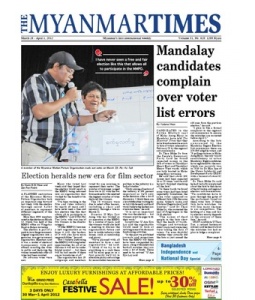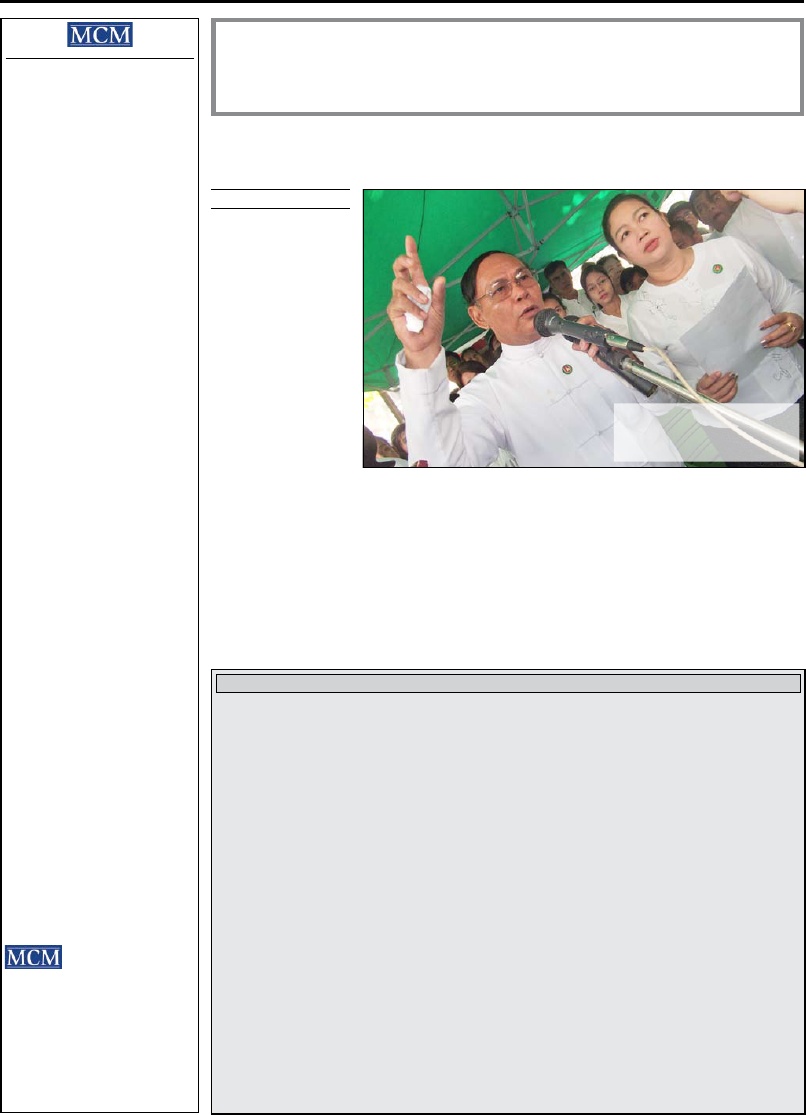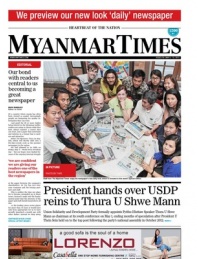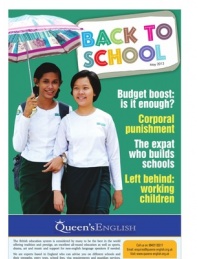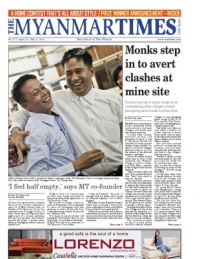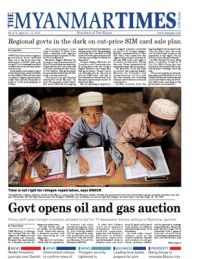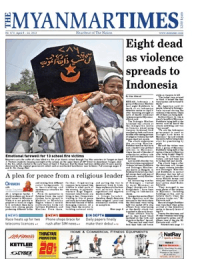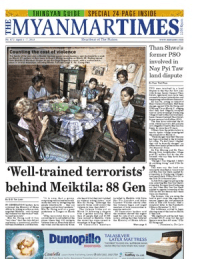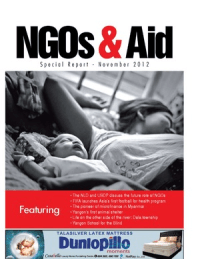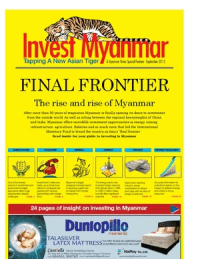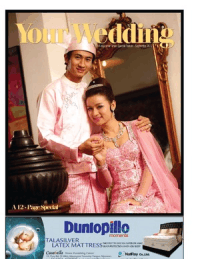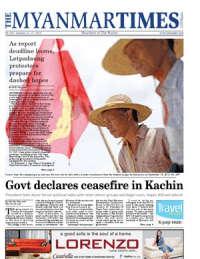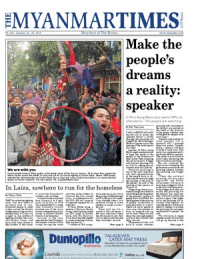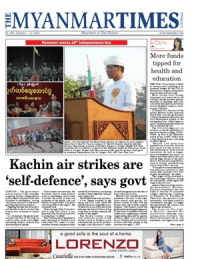myanmar
times
t H e
March 26 - April 1, 2012
Myanmar’s first international weekly Volume 31, No. 620 1200 Kyats
By Yadana Htun
CANDIDATES in thePyithu Hluttaw seatof Maha Aung Myay inMandalay have told
The Myanmar Times
that theyhave found extensive errorsin lists of voters released onFebruary 29 by the regionalsub-commission.Dr Than Htike Oo fromthe People’s DemocracyParty said he foundrepeated names in thelists of voters in ThanhlyatHmaw East and ThanhlyatHmaw West wards, whichare both located in Maha Aung Myay township.He said that about 100names had been repeated15 or 20 times “and we stillhaven’t finished checkingall the lists”.“In these wards we foundsome voters had been listedrepeatedly. Sometimes, thesame voter appeared ondifferent lists with the samename, father’s name and[National Registration Card]number,” said Dr ThanHtike Oo, who contested theseat of Pyigyitagun in the2010 election.“The names of deadpeople in the lists showthat the heads of wards,villages and townshipsdidn’t work well while theywere taking the data of voters. I’m even doubtfulwhether they actually didthe lists or just reused theold ones from the previouselection,” he said.“I plan to file a formalcomplaint to the regionalsub-commission to ensurethe mistakes are correctedbefore April 1.” According to the listsannounced by theMandalay Region ElectionSub-commission there are129,850 eligible voters and79 polling stations in Maha Aung Myay, the only vacantconstituency in urbanMandalay. Eight candidateshave registered for the seat,which was narrowly wonin 2010 by Dr Mya Aye of the Union Solidarity andDevelopment Party (USDP)with a turnout of about 62percent.Dr Than Htike Oo saidhe had verbally complainedabout the lists to the chairsof the township and regionalelection sub-commissions.“We candidates have topass through the gates of the parliament based onthese voter lists. If theselists have mistakes, wewill lose many chancesto our competitors. Theholding of a free and fairby-election mostly dependson the accuracy of theselists,” he said.USDP candidate U ThanTun, a retired lieutenantcolonel, said he heard aboutthe mistakes but had noplan to lodge a complaint.
Mandalaycandidatescomplainover voterlist errors
More page 4More page 4By Nyein Ei Ei Htwe andZon Pan Pwint
A PLANNED restructureof the Myanmar MotionPicture Organisation tookan important step forwardlast week, with the electionthrough secret ballotof members to representdifferent segments of theindustry.More than 1900 membersvoted in the election on March23, which was held at theMMPO office on WingabarRoad in Bahan township.The election is part of apush to turn the government-aligned organisation into agenuine non-governmentorganisation. Members saidit was a model of electoraltransparency, with pollofficers counting the votesin public and declaring thewinner immediately after allvotes had been counted.No advance votes werecast.Many who voted lastweek said they hoped thatthe election would result inthe MMPO being reformedinto an organisation thatworked for the benefit of itsmembers.“I’ve been working in thefilm and video industryfor nearly 40 years and Ihave never seen a free andfair election like this thatallows all to participate inthe MMPO,” said U Nyi NyiTun Lwin, who was one of two winners in the directorcategory.“If [the MMPO] becomesa new organisation as wehope it will, the leadersof it will also have moreresponsibilities,” he said.“But I believe [reformingthe MMPO] will bring betteropportunities for all of usbecause it will not be under[state] control … but therewill be bad results if thereare no boundaries at all.”The organisation has 10subgroups and membersvoted for one nominee torepresent their sector. Thenumber of nominees rangedfrom two to 13, with the twofrom each sector who receivedthe highest number of votesdeclared the winners.The 20 winners weredue to select office bearers,including a chair andsecretary, through a vote onMarch 24.Director U Myo Zaw Aung, who has worked asan executive at the MMPOfor a number of years, saidthe winners would also holda meeting to discuss theorganisation’s future andhow to tackle industry-wideissues, such as censorshipand piracy.“We’ve planned with allmembers to form a neworganisation,” he said.“I think if we try to doeverything in a rush therewill be many gaps so as afirst priority we’ll try toeliminate piracy and arrangefor more studios because oneproblem in the industry is alack of studios.”“Unity among all sectors of the industry is 100 percentimportant so we’ll onlymake decisions after a lot of discussion. I think there area lot of difficulties waiting forus but with honesty and hardwork I believe the leaders canovercome these,” he said.“It is not so importantwho won the election … butwinners must be eager to dotheir work.”Scriptwriter U Aye KyuLay said the organisationwould need to look atreviving some of its dormantfundraising activities.“In the past we published journals and magazinesfrom the MMPO but thesehave been suspended foryears, along with [celebrity]football matches that canraise a lot of funds. Thoseneed to be revived,” U AyeKyu Lay said.
Election heralds new era for film sector
A member of the Myanmar Motion Picture Organisation reads out votes on March 23.
Pic: Ko Taik
I have never seen a free and fairelection like this that allows all to participate in the MMPO.
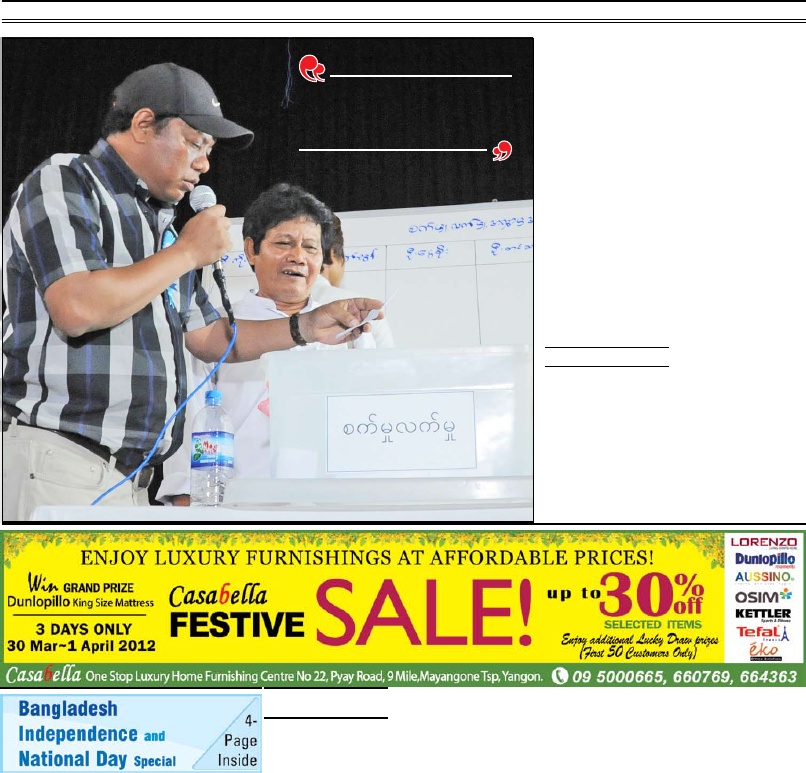



C
omment
the
M
yanMar
t
iMes
2
March 26 - April 1, 2012
By U Than Pe
IT is an open secret thatall who have a connectionwith the use of the Englishlanguage know. Some areeven raising a feeble murmurof dissatisfaction about it – butnobody seems to be listening.It is high time something isdone about the deplorablelevel of English teaching inschools and institutions of higher education.Today’s young graduatesproduce horrible sentences inEnglish. If there was only onegraduate of that calibre thenhe could be labelled a sloppystudent and a fluke but whenthere are thousands morelike him the blame must liesomewhere else. It is clearlya case of systemic failure of the first degree.People of this country areno lazy sluggards. We have,in the past, produced sucheminent people like Dr BaMaw, Dr Htin Aung, U Nu,U Thant, Sao Khun Cho –people who shone brightly oninternational stage in theirrespective fields. Today’syouth are their descendants.The same blood flows in theirveins and arteries.Have our youth becomesluggish now? No. A definite“No”, with a capital “N”. A casual survey will showthe discerning observerthat today pupils spend adisproportionately largeamount of time studyingEnglish. Research on thattopic would no doubt stunthe researchers.Every parent knows howmuch time their childrenspend on English. They alsoknow how much they have topay in tuition fees. In mostcases tuition teachers arethe people who taught thepupils during school hoursearlier in the day. It does nottake much imagination tosee that the people who areentrusted with the task of teaching are not doing theirduty. If these people werein the construction businessthey could be charged withdereliction of duty but not soin the teaching business.Well, this is not thewhole story. On closer lookthe people who teach, inmany cases, do not knowsimple grammar and correctpronunciation. Anyonedoubting this assertioncan pick out a few peopleteaching English to five toseven-year-olds or youngerand set them a simple test. As teachers they do notlack
ceitana
, the Buddhistvirtue of goodwill towardstheir learners. The problemis these people do not knowtheir own shortcomings inpronunciation, grammarand usage. They, in theirturn, had received similarcoaching. If the chain of events is followed or tracedbackward the source of problem is sure to be foundsomewhere between the years1964 and 1966, includingboth of those years.Nationalisation of privateand mission schools,reorganisation of theadministration of schools andthe downgrading of Englishat the university levelresulted in a lack of qualitycontrol and inspection. Thepsychological blow thatEnglish teaching receivedduring those three yearswas devastating. It neverrecovered the prestige it onceenjoyed.What happened duringthose three years wasquite bad. But worse wasstill to come, and come itdid, in 1972-73. It was thebombshell that sounded thedeath knell for the futureof English language in thiscountry. It was the fatalblow from which it will bevery difficult to recover. Itwas the declaration thatEnglish would be taught tochildren as young as fivein kindergarten classes allover the country by totallyuntrained and unqualifiedteachers.Since then English hasbeen taught to the youngtots by untrained, freshgraduates. Among thesegraduates were very fewEnglish majors. Those thatwere, were appointed assenior teachers. Primary kidsgot graduates who majoredin subjects like physics,chemistry, philosophyand other subjects totallyunconnected with teachingstudents of their age. According to those whohave researched the studyof a second language, achild should not be taught asecond language before it hasmastered its mother tongue.The only exception is themethod called “immersion”,whereby the learner isplaced in a situation wherehe or she is exposed to theuse of the second language24 hours a day for the lengthof time needed to absorbthe fundamentals of thelanguage. That system is, of course, the best for impartingnear native fluency in thetarget language. But it isalso obvious that every childcannot avail itself of thatfacility.Immersion method is bestbut it is very expensive andimpractical on a nationwidescale. At best it can beoffered to a few children. Butthere are other alternativesavailable. One of them hasbeen employed successfullyin many countries and it wasalso used in this country until1962. A little explanationmay be appropriate here.Until the early 1960s thatparticular method was usedin our state schools and it wasabout 20 percent successful.No language teachingmethod is, or has ever been,proved 100pc successful. Anyway, 100pc success is notnecessary – even developedcountries cannot teachsecondary languages to allof the population and noteverybody needs secondlanguage fluency.That method was usedwith proper inspection andwell conducted tests. After1962 many teachers startedhobnobbing with the SocialistParty, thereby neglectingtheir primary duty of teaching. Party interferencein the administrationproduced chaos in inspectionand discipline. That in turnaffected the teaching and allsubjects suffered.Before that malady setin, English was taught bya variety of translationmethods. Teachers gave themeanings of new words inthe vernacular one day andgave the lesson containingthat mastered vocabularythe next day. Lessons wereexplained in the mothertongue and dictations weregiven to correct spellingmistakes. A few questionson the text, either oral orwritten, complementedlessons from a textbook.There were periods setaside for grammar andcomposition, essay writing,précis writing and study of poetry. Teachers in thosedays (until the end of 1961-62 academic year) weregood enough to producematriculates who could readand understand textbookson subjects taught inuniversities. Almost all thetextbooks in those dayswere written by foreignersand printed abroad. Today’sstudents will find it hard tobelieve that in those daysthere were no tuition teachersor guides, the twin scourgesafflicting the students andpupils of today.The detailed workingsdescribed above may notinterest the policy makersbut they are essential nutsand bolts for the success of the whole system. Whenthey are ignored andneglected, systemic failureis inevitable. Policy makersshould remember that thestrength of the strongestchain is measured by theweakest link in that chain.Replace the weakest linkand the system can be backon track in no time. It ishigh time necessary actionis taken to cure the malady.The nation should rethink– and rethink quickly – itseducation policy for the longerwe procrastinate, the moredifficult reform will be.(
U Than Pe is a tour guide from Sanchaung township.
)
Time to overhaul English teaching
Students leave a school in Yangon after a recent matriculation exam.
Pic: Yadanar
By Aung Tun
IN recent months debateshave been taking place acrossthe country, and in particularabout the peace process isbeing conducted in ethnic-minority dominated areas.Some ceasefires have beensuccessfully implemented,while some are yet to reacheven that initial status. Thenew government has set outthree key points in generalfor the peace process with thecountry’s very diverse ethnicgroups: ceasefire, politicaldialogue and permanentpeace. At the same time, thenational budget for the2012-13 fiscal year is beingdebated in the capital NayPyi Taw. These might seemlike two mutually exclusiveevents. However, thesedecades-old ethnic wars havehad a significant impacton the nation’s economicdevelopment and the budget’sbottom line.There are many politicaland economic angles toconsider here. First, we shouldlook at the pure financial costof these civil wars. Second,who paid for it? Third, whatif we had used that money forthe development of the regionwhere the fighting has takenplace instead of the wars?Fourth, who benefited fromthe wars? And last and mostimportantly, what should wedo next?There is no definite answerto the first question, althoughit worth considering thatwhatever a bullet cost 50 yearsago, it would be many timesmore than that right now dueto inflation. Certainly, thecost to the government hasbeen massive; you only needto look at defence spending– K1.193 trillion in 2011-12– to get some idea of the costof perpetual conflict.The second question iseasier to answer: we allhave to pay for it, and thisis a major reason why we’renow all in a large amount of debt. Recently, the financeminister announced inparliament that we owemore than US$11 billion. Nosurprises there.The answer to the thirdquestion is the really tragicaspect of this, particularly inan age when it is quite difficultto get money from donors.Everybody knows that we arethe lowest recipient of aid percapita among undevelopedcountries. Yet, we have stillspent our own money onthese conflicts. If we usedthis money on developmentprojects instead, we probablywouldn’t need to receivesupport from other countriestoday.There’s an obvious answerto the fourth question: nobodyreally benefited from thewars. Many people, bothmilitary and civilian, havedied, children missed outon their education, refugeescamps had to be set up alongthe border areas, politicalstability has declined anddevelopment in other areasof the country has beenhindered. If we add in theadditional costs of theseethnic conflicts, the externaldebt figure doesn’t sound solarge.So let’s address the fifthquestion – perhaps the mostdifficult one. An excellentstart would be to avoid thewars that have dogged us fordecades. Both politically andeconomically, the countrycan’t bear any armed conflictat this crucial time.During his address toparliament earlier thismonth, President U TheinSein seemed to emphasisethe economic loss of theseinternal wars. The next day,The
New Light of Myanmar
proudly carried his wordswith the headline: All musttry to see national race youthswho brandished guns usinglaptops.Personally, I couldn’t agreemore, except to say that wecould probably have given twolaptops to each ethnic youthif we didn’t fight so much inthe past, with one comingfrom the ethnic army and onefrom the government. Nowis the time for both sides togive the young people of ourcountry that opportunity.(
Aung Tun has formerlyworked at
The MyanmarTimes
and non-governmentorganisation Proximity Designs and is currently aresearch fellow at Myanmar Egress, a Yangon-basedtraining centre and policythinktank.
)
The economic cost of conflict
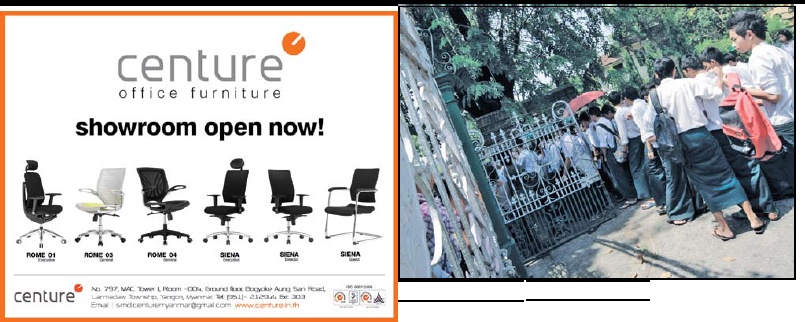




n
ews
3
the
M
yanMar
t
iMes
March 26 - April 1, 2012
By Kyaw Hsu Mon with
AFP
THE government has invitedUS, European and otherobservers for the April 1 by-elections, an official said lastweek, allowing internationalscrutiny of polls seen asa major test of its reformcredentials.“We welcome theinvitation of observers,” saida spokesman for the NationalLeague for Democracy(NLD), U Nyan Win. “Theyshould be allowed to watchand assess freely.”President U Thein Seinvowed to ensure the by-elections were transparent,Cambodian governmentspokesman Mr KhieuKanharith said followingtalks in Phnom Penh withCambodian Prime MinisterMr Hun Sen.“The president of Myanmarhas assured that he will tryhis best to make the electiontransparent and acceptable.That’s why he will inviteobservers,” the spokesmansaid.Observers from theUS, EU, UN and ASEANhave been invited for the April 1 polls, a Myanmargovernment official said onMarch 21.“It will be up to thecountries whether theysend people from overseasor inside Myanmar,” he said,without specifying how manymonitors would be allowed.Chief presidential adviserfor political affairs U KoKo Hlaing said the move toallow observers shows thatthe government and electioncommission wants the by-elections to be free and fair.“Those in charge, suchas the president, the UnionElection Commissionmembers, candidates andpolling station managers,are trying their best becausethis is a critical time forthe country,” he told
The Myanmar Times
on March22.“The internationalcommunity may not realiseall of this though so [allowingobservers] is a good sign forthe by-elections,” he said.“Without inviting theelection monitors andobservers from abroad, theywill probably have come outafterwards and questionedwhether the election wasfree, fair and transparent.With the monitors, observers,they will definitely see whathappened in the election andhow it was free and fair.“There are no perfectelections anywhere in theworld so the decision makersneed to solve any problemsthat arise according to therules.”U Kyaw, a Yangon RegionHluttaw representativefor the New NationalDemocracy Party, which willcontest three seats in the by-elections, said he “very muchwelcomed” the president’sinvitation to internationalobservers and monitors.“It is good that it isnot only [observers from] ASEAN but also Westerncountries – it will make itmore transparent” than in2010, he said, adding that hehoped there would be greaterscrutiny of vote counting.US State Departmentspokeswoman Ms VictoriaNuland said Myanmar hadinvited two US observers andthree US journalists.“We will obviously take upthis opportunity to monitor,”she said.“But we would obviouslyencourage the Burmesegovernment to try to bringthis monitoring effortas closely as they can tointernational standards.”The US embassy in Yangonearlier described the move as“encouraging”.“Having observers is onestep, but to have a free andfair election there reallyshould be no violence andintimidation as well,” saidembassy spokesman Mr MikeQuinlan, noting that reportsof irregularities in the votingprocess and cases of allegedintimidation needed to beaddressed.There was no officialreaction from the EuropeanUnion, but an EU official inBangkok who did not want tobe named said that at leastsix months of preparationwas usually needed for anobservation mission.Foreign election observersand international mediawere not allowed into thecountry for the November2010 general election, whichwas denounced by Daw AungSan Suu Kyi’s oppositionparty and Western powersas a sham.The NLD cannot threatenthe ruling party’s majorityeven with a strong result inthe 48 constituencies up forgrabs.But experts believe theregime wants the pro-democracy leader to win aplace in parliament to giveits reform drive legitimacyand encourage the West toease sanctions.“It is in the interest of thegovernment that the electionis free and fair, so it is onlylogical that there are someobservers,” said Myanmarexpert U Aung Naing Oo of the Thailand based think-tank Vahu DevelopmentInstitute.“It is important for acountry like Myanmar toget used to complaints inthe election, to get usedto cheats, to get used tomonitors coming in, andto get used to the electioncommission doing its job,”he added.The NLD also saidthat in the constituencyof Kawhmu near Yangon,where Daw Aung San SuuKyi is standing, the namesof hundreds of dead peoplewere found on the voter list.
Govt invites poll observers
National League for Democracy supporters attend a rally in Mingalar Taung Nyunt township last week.
Pic: Yadanar
YANGON – The governmenthas postponed by-electionsin three constituencies inKachin State because of security concerns, statemedia reported last week.Fierce fighting betweengovernment and KachinIndependence Army troopsin parts of mountainousKachin State near theChinese border since Junelast year has displaced tensof thousands of people.“Because of securityreasons there are noconditions to hold freeand fair elections,” statetelevision said on March23.National League forDemocracy spokespersonU Nyan Win expresseddisappointment at thedecision to indefinitelypostpone voting in three of the 48 vacant seats.While the governmentthat came to powerlast year has signedpeace deals with otherinsurgent groups, severalrounds of talks with theKachin IndependenceOrganisation have failedto bear fruit.“The fighting is stillhappening in some areasin Kachin state almostevery day,” said U YupZaw Hkaung, a prominentKachin businessman whois acting as a mediatorbetween the governmentand the rebels.During a recent visitto Myanmar, US specialenvoy Derek Mitchell saidthe violence in KachinState was inconsistentwith the government’sreformist bent.“The immediate concernthat we have is on the issueof internally displacedpersons, who by anydefinition are innocentscaught in the crossfire of conflict,” he said, urgingthe government to enableaid to reach the victims.Despite the securityconcerns, Daw Aung SanSuu Kyi visited two of the Kachin constituencieslast month as part of hercampaigning. The delaymeans voting will nowbe held in April in 45constituencies elsewherein the country.–
AFP
By-elections postponedin Kachin Statebecause of security fears
THE number of foreigntravellers arriving inMyanmar through YangonInternational Airport jumped by more than 40percent in February on theprevious year, figures fromthe Ministry of Hotels andTourism show.The figures also showthat foreign arrivals forJanuary and Februarywere up by nearly 40pcon the same months lastyear. A total of 50,243 foreigntravellers arrived through Yangon International Airport in February, up41.41pc on the same monthin 2011. Arrivals for Januaryand February totalled98,486, up 37.75pc on thesame months the previousyear.The overwhelmingmajority of the arrivalsfor both months wereindependent travellers,with 32,960 in February(up from 24,386 theprevious year) and 32,250in January (24,024).The figures for Januaryand February show thatthe number of arrivals hasmade a solid start this yearas they account for 27.4pcof the 359,359 foreigntravellers who enteredthe country through the Yangon gateway during2011. –
Geoffrey Goddard
Foreign arrivals rise inJanuary, February
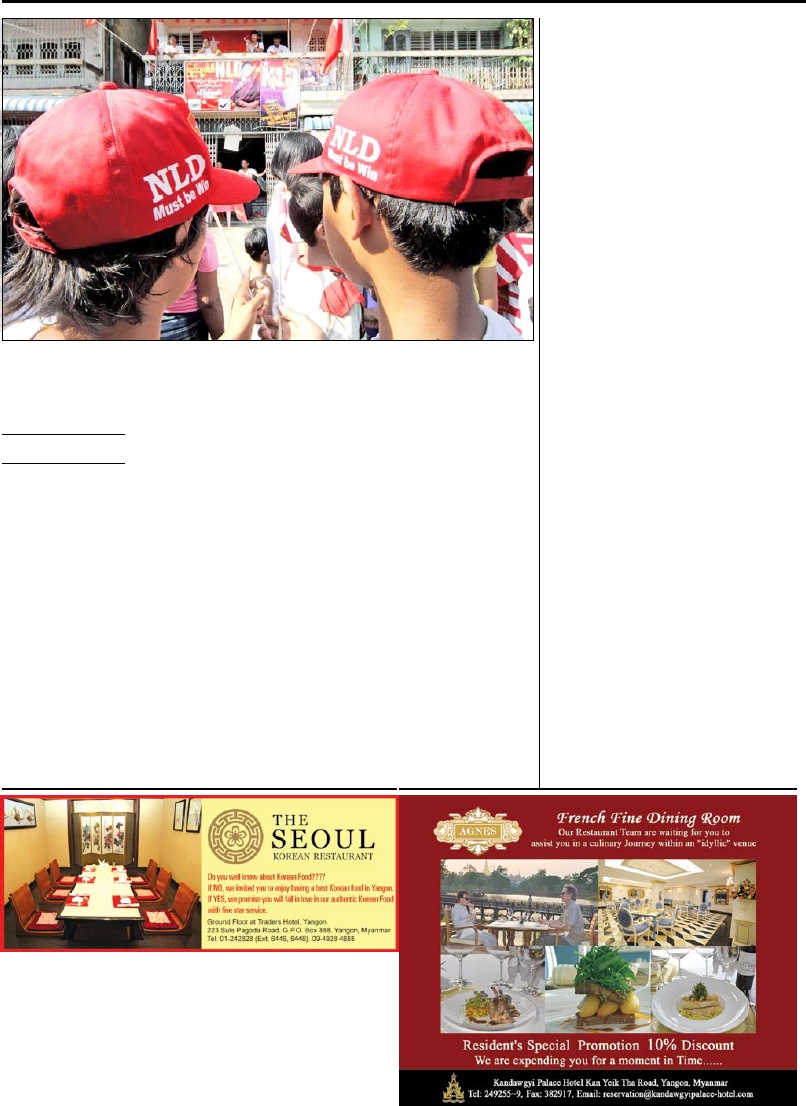


検索履歴:
結果00中00
00結果次の結果
p.
Notes
Post Note
